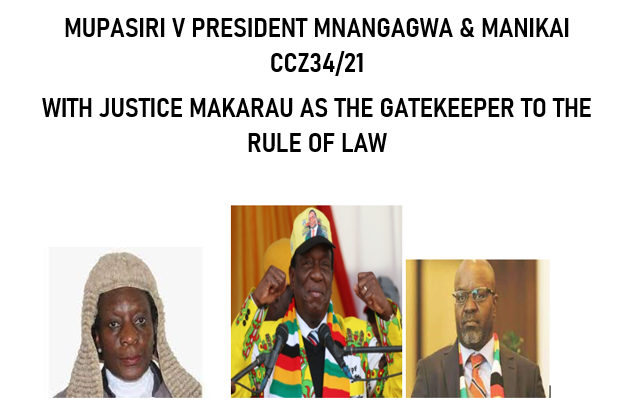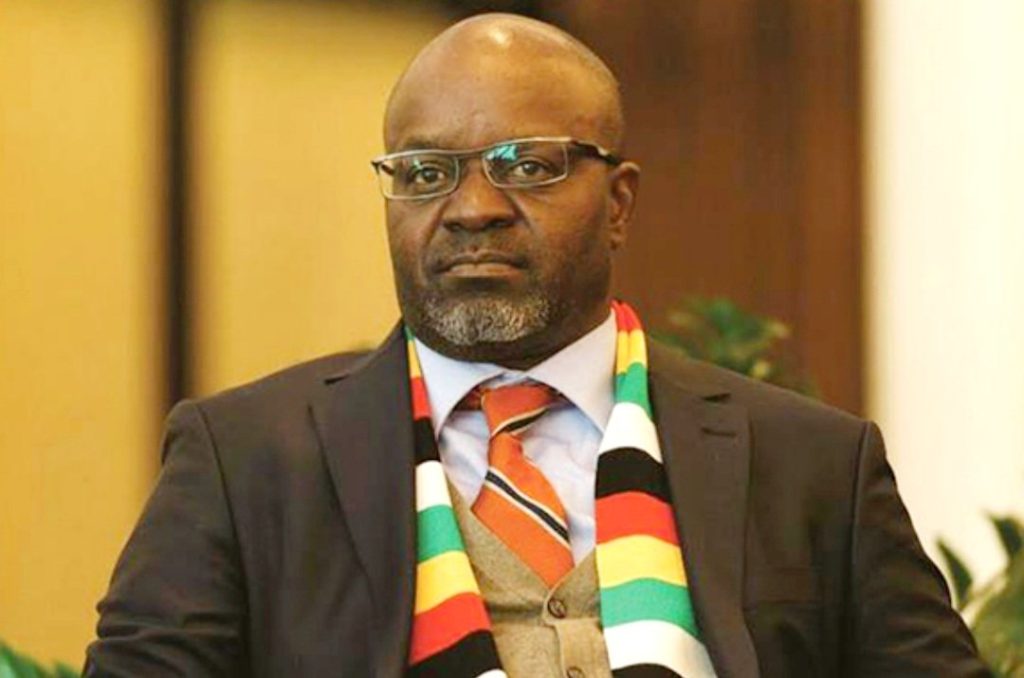Africa
Justice Makarau is cornered
Published
2 years agoon
By
Peter Smith
President Mnangagwa who is the Respondent in a section 167 application launched by Mr. Tichaona Mupasiri (TM) on 17 December 2021 defended himself in relation to serious and scandalous allegations made by his lawyer, Mr. Edwin Manikai, on 27 March 2021, that he was the driving force behind the attack on SMM Holdings Private Limited (SMM)’s control and management under a project that can APTLY be described as RECONSTRUCT MAWERE involving the use of extrajudicial measures to achieve this.
Manikai’s utterances that triggered the facts and events leading to TM approaching the Court seeking the Court to determine if President Mnangagwa’s decision to refuse and fail to give his own version of his personal knowledge and involvement in relation to the facts and circumstances of the reconstruction of SMM.
Below, Manikai states as true and fact as follows:

Set out below is what Manikai said:

Contrary to what Manikai alleged above that the decision to divest and deprive Mawere of all his Zimbabwean assets in Zimbabwe, Zambia, South Africa, and the UK was triggered by a major political fallout between President Mnangagwa and Mawere, the ultimate shareholder of SMM, President Mnangagwa used the defence of res judicata as one of his many reasons why the Mupasiri application should never be granted on merits:

The President who is represented by DMH Attorneys boldly asserts that the defence of res judicata is appropriate and legitimate given that Zimbabwean courts have spoken to the constitutional validity of the judicial findings in relation to this question.
In the premises, President Mnangagwa told TM to take a hike and advised TM who is a self-actor in the matter, to bring an application for rescission of all judgments that he feels were improperly obtained.
President Mnangagwa concluded above that he had no duty to test the veracity of the allegations made by Manikai that facts of SMM confirm the version of Manikai that absent the active involvement of state actors like Chinamasa and President Mnangagwa, state institutions would not have been paralyzed to knowingly and intentionally condone and acquiesce to the modus operandi used to achieve the outcome of using public power and institutions to deprive and divest of rights and freedoms reserved by the rule of law to all citizens including Mawere.
The President put the judiciary’s role in the SMM’s saga under the spotlight by stating under oath that: “Without the recall of orders on the basis upon which the reconstruction process was conducted, this application is incompetent. IT MUST FAIL.“
The President also challenged TM’s locus standi as follows:

Against the above backdrop, Mawere in his application under Case Number 10/22 for leave to intervene in this landmark constitutional application in post-colonial Zimbabwe, asserts that since the President invoked his name as the driver of TM’s constitutional application, it is in the interests of justice that the court grants him the leave so that he can respond to the allegations made by President Mnangagwa that the judgments TM rely upon us tainted by fraud should be openly and transparently interrogated so that the Court can determine whether his reliance on what TM believes to be fatally defective judgments is by design or part of a criminal syndicate as admitted by Manikai.
It is worth pointing out that President Mnangagwa has confirmed that he was intimately involved in the affairs of SMM although he stated in his affidavit that:

Notwithstanding the above bold statements by President Mnangagwa, he asserted in paragraph 72 of his opposing affidavit in relation to TM’s application that: “the facts relating to SMM are known to him.”

It is on record that the refusal or failure by President Mnangagwa in response to the Manikai’s version is connected to his alleged role in the abuse of public power in a brazen and draconian manner.
“All along, I thought it just a rumor that President Mnangagwa was the driving force of the demise of SMM but this TM court application is unraveling what many of us thought was a dead case.
I have been following this matter closely over the years and more recently as a member of FOSMM and now I can connect the dots that have been missing in the narrative.
President Mnangagwa has for the first time given his version in form of a sworn statement and it does help any citizen to know why he is not prepared to disclose his state of knowledge and more importantly his involvement in this epic attack on constitutional democracy.
It is now official that President Mnangagwa was fully briefed and the implications of this admission are that he has constructive knowledge of all the pertinent facts known to him to respond to Manikai’s important revelations that he put his personal interest to be President above his oath of office,” said Mr. Tee Siya who is based in Botswana and is a member of the Justice Under Rule of Law (JUROL), an initiative that is chaired by TM as part of the pursuit to ensure that the barbaric methods used to destroy SMM and related entities will never happen again.
“It is striking that a tainted judge like Makarau who presided on an application by SMM’s sole shareholder, SMM Holdings Limited (SMMH), a UK registered company and exposed the fact that she constructively and intentionally to the prejudice of SMMH refused to consider the merits of the matter knowing that absent merits no appeal could be mounted.
I have in the context of the FOSMM Corporate Literacy Programs, been astounded that a judge who is not bound by the limitations imposed by the Constitution was promoted over the years resulting in her present position without being exposed and flushed from the system.
On 14 October 2020 well before the Mupasiri court application, an article was published by the zwnews24.com online publication as follows: https://zwnews24.com/justice-makarau-a-big-disappointment-mkoma-masimba-bhukurebenzi/2020/.
I am thrilled that the despicable conduct of Makarau is now inside the court and not in chat groups and I am encouraged that she is now being made to account for her judgments.
With respect to the review application that she dismissed without looking at merits, I have checked with legal scholars that an independent and impartial judge can have the title in a constitutional court to adjudicate a dispute without having regard to the merits.
I was shocked to learn that Justice Makarau was angry with TM for raising the issue of her reprehensible conduct of using technicalities to deny THZ Holdings Limited (THZH) access to justice and to determine its rights and freedoms without considering the questions put to the court on merit.
Having read President Mnangagwa’s opposing affidavit to TM”s breach of office complaint, it is clear that the President has something to hide. However, the attempt to use the judgments of corrupt judges as his defence for failing to uphold his constitutional duties is chilling and disturbing.
I have read this article and I fully associate with the position that Justice Makarau knew and ought to have known that by ignoring the merits of the review application, she had effectively closed the door to any remedy of appeal, review, and rescission as her judgment was not based on any reasoning at all but nothing.
The inescapable conclusion is that the integrity and trust that should underpin the judicial system as an independent and impartial organ of government is being systemically and systematically undermined but the very people we look up to uphold and defend it,” said Mukoma Masimba, a member of FOSMM and JUROL.
In his recusal application, Mawere framed his cause of complaint against Justice Makarau presiding over the application for leave to intervene:

Set out below is what Mawere stated in his application (the link to all the court submissions by the Intervening Parties and the Respondents can be found on: https://online.flipbuilder.com/mmawere/sdci/:

The firm, DMH, and the person of Edwin Manikai prosecuted this matter to permit Manikai, the Second Respondent in the TM challenge, to fail to correctly inform President Mnangagwa that the version given to the Court by Mawere was true and factual.
“I am surprised that a lawyer, an officer of the court with a duty to upholding the rule of law, would be complicit in the obvious perjury involved in the President, the Chief Executive Officer of the country stating under oath that

This is what Justice Makarau stated in her judgment that can be found here: https://online.flipbuilder.com/mmawere/sdci/ on this matter:

Against the above, would it not be in the interests of justice for the President to be compelled to give his own version of facts on how Justice Makarau’s version that she did not consider the judgment on merits can be substituted by the President’s sworn statements based on fabrications?
Set out below, are the results from a search on the words: “ON THE MERITS.”
“The phrase “on the merits” refers to a case whose decision rests upon the law as it applied to the particular evidence and facts presented in the case. This is in opposition to cases whose decisions rest upon procedural grounds.”
What is a judgment on the merits?
“On the merits” refers to a judgment, decision, or ruling that a court will make based on the law, after hearing all of the relevant facts and evidence presented in court.
What does merit mean in court?
“referring to a judgment, decision, or ruling of a court based upon the facts presented in evidence and the law applied to that evidence. A judge decides a case “on the merits” when he/she bases the decision on the fundamental issues and considers technical and procedural defenses as either inconsequential or overcome.”
What is merit in court?
“In law, merits are the inherent rights and wrongs of a legal case, absent of any emotional or technical bias. The evidence is applied solely to cases decided on its merits, and any procedural matters are discounted. The term comes from Old French merite, meaning “reward” or “moral worth”.
What is merit defense?
“MERITS. This word is used principally in matters of defence. 2. A defence upon the merits, is one that rests upon the justice of the cause, and not upon technical grounds only; there is, therefore, a difference between a good defence, which may be technical or not, and a defence on the merits.”
What are the merits of a matter?
“merits, the inherent rights, and wrongs of a matter, as a lawsuit, unobscured by procedural details, technicalities, personal feelings, etc.: The case will be decided on its merits alone.
A decision on the merits is a decision based on evidence rather than on technical or procedural grounds. It is an ultimate decision rendered by a court in an action that concludes the status of legal rights contested in a controversy.”
What does judged on its merits mean?
“phrase. If you judge something or someone on merit or on their merits, your judgment is based on what you notice when you consider them, rather than on things that you know about them from other sources. Everybody is selected on merit. Each case is judged on its merits.”








Warning: Undefined variable $user_ID in /home/iniafrica/public_html/wp-content/themes/zox-news/comments.php on line 49
You must be logged in to post a comment Login